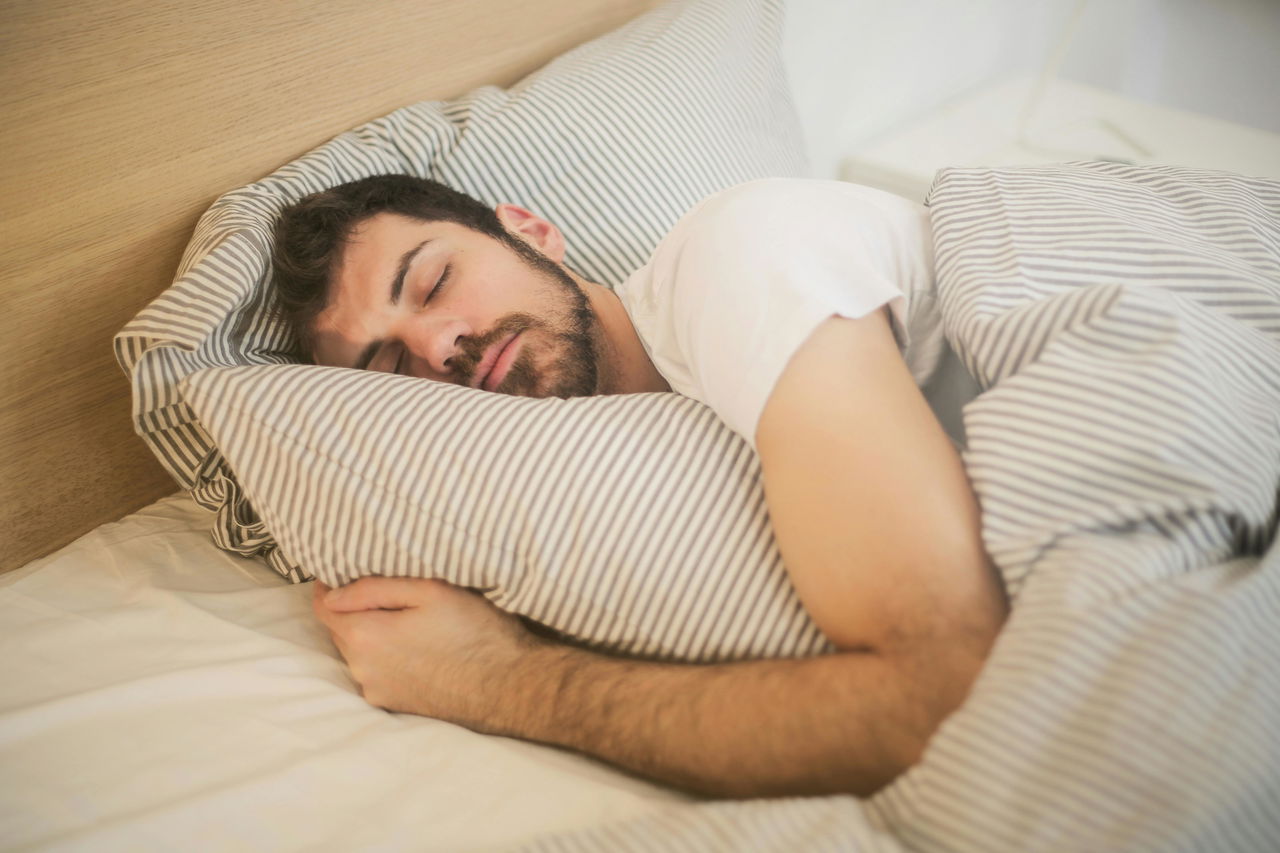
Nicotine's Effect on Sleep Quality

Written by
Published
Wed, 01/10/2025
The relationship between nicotine and sleep is a complex one, often characterized by a paradoxical interplay of stimulation and disruption. While some individuals might use nicotine with the intention to improve sleep, the reality is that nicotine affects sleep in predominantly negative ways, often leading to poor sleep quality and a host of other sleep-related problems. This article delves into the various facets of how nicotine impacts sleep, exploring its mechanisms and offering insights into mitigating its adverse effects.
Understanding Nicotine
What is Nicotine?
Nicotine is a highly addictive stimulant drug that affects the brain and nervous system. It is naturally found in tobacco plants and is the primary psychoactive component in cigarettes, e-cigarettes, and other tobacco products. The effect of nicotine is primarily mediated through its interaction with nicotinic acetylcholine receptors in the brain, leading to the release of neurotransmitters such as dopamine, which are associated with pleasure and reward, ultimately contributing to nicotine dependence.
Sources of Nicotine
The most common source of nicotine is undoubtedly tobacco products, including cigarettes, cigars, and chewing tobacco. However, with the rise of vaping, e-cigarettes have become a significant source of nicotine consumption. Furthermore, nicotine replacement therapies (NRTs), such as nicotine patches, gum, and lozenges, are also sources of nicotine, albeit intended for smoking cessation rather than recreational use. Each of these sources has a unique way of delivering nicotine, which can impact sleep differently.
Source of Nicotine
Tobacco Products
Alternative Nicotine Products
Examples
Cigarettes, cigars, chewing tobacco
E-cigarettes, Nicotine Replacement Therapies (NRTs)
Nicotine and its Usage
Nicotine is used for a variety of reasons, ranging from recreational enjoyment to self-medication for stress or anxiety. Many individuals use nicotine as a stimulant to enhance focus and concentration. However, its addictive nature often leads to habitual nicotine use, resulting in nicotine dependence. The impact of nicotine can also extend to its perceived effects on sleep, with some users believing that it helps them relax before bed, despite evidence indicating the opposite. Understanding these patterns of nicotine use is crucial to understanding its relationship to sleep problems.
The Relationship Between Nicotine and Sleep
How Nicotine Affects Sleep Quality
The way nicotine affects sleep quality is multifaceted and generally detrimental. One of the primary effects of nicotine on sleep is the disruption of sleep architecture. Nicotine acts as a stimulant, interfering with the natural progression through the different sleep stages. This can lead to a reduction in the amount of time spent in deep, restorative sleep, which is crucial for physical and cognitive recovery. As a result, individuals who use nicotine often experience poor sleep quality, characterized by frequent awakenings and a feeling of being unrested even after several hours in bed. The impact of nicotine extends to subjective sleep quality, where individuals report feeling less refreshed and more tired upon waking.
Effects of Nicotine on Sleep Disturbance
Nicotine is a known contributor to sleep disturbance, exacerbating existing sleep issues and potentially triggering new ones. The stimulant effect of nicotine can make it difficult to fall asleep initially, increasing sleep latency. Furthermore, the effects of nicotine on sleep often include disrupted sleep patterns throughout the night, as the body experiences nicotine withdrawal. This withdrawal can lead to awakenings, restlessness, and an overall sense of unease, significantly reducing sleep efficiency. The relationship between nicotine and sleep disturbance is particularly pronounced in heavy smokers, who may experience more frequent and severe sleep problems compared to non-smokers or occasional nicotine users. For people who use a nicotine patch as a method of quitting smoking, sleep disturbance is a frequent and unfortunate side effect.
Nicotine Keep You Awake: The Mechanism
The mechanism by which nicotine keeps you awake involves several neurochemical processes. Nicotine stimulates the release of neurotransmitters such as dopamine, norepinephrine, and acetylcholine, which increase alertness and arousal. This heightened state of arousal counteracts the natural processes that promote sleep. Moreover, nicotine affects the production and regulation of melatonin, a hormone that plays a crucial role in regulating the sleep-wake cycle. By suppressing melatonin production, nicotine can further disrupt sleep patterns and make it harder to fall and stay asleep. Therefore, people who want to improve sleep must understand that nicotine affects sleep on many levels.
Impact of Nicotine on Sleep Patterns
Sleep Problems Associated with Nicotine Use
The impact of nicotine use on sleep health is far-reaching, often manifesting as various sleep problems. Many individuals using nicotine find it difficult to fall asleep, experiencing prolonged sleep latency. This is due to the stimulant effects of nicotine, which interfere with the body's natural transition into a state of relaxation conducive to sleep. Furthermore, the effect of nicotine extends to disrupting sleep maintenance, leading to frequent awakenings throughout the night. These sleep issues ultimately lead to insufficient sleep and contribute to an overall poorer quality of sleep. The severity of these sleep problems often correlates with the level of nicotine consumption and the individual's overall sleep habits. It is crucial to understand the relationship between nicotine and sleep to address these issues effectively and improve sleep.
Impact of Nicotine on Sleep Architecture
The architecture of sleep, which refers to the cyclical progression through different sleep stages, is significantly affected by nicotine. Nicotine affects the normal sleep cycles, reducing the amount of time spent in deep, restorative sleep stages. This has profound implications for physical and cognitive recovery, as deep sleep is essential for these processes. The effect of nicotine on sleep architecture also extends to REM sleep, the stage associated with dreaming and memory consolidation. Some studies indicate that nicotine affects sleep in delaying the onset of REM sleep and potentially reducing its duration. These alterations in sleep architecture contribute to the overall poor sleep quality and may exacerbate existing sleep disorders. When a person uses nicotine, the impact on sleep is visible in each stage.
Smoking and Sleep Disturbance: A Closer Look
Smoking and sleep are closely linked, with evidence suggesting a strong association between smoking and various forms of sleep disturbance. Individuals who smoke, especially those with nicotine dependence, are more likely to experience difficulties falling asleep, staying asleep, and feeling refreshed upon waking. The effect of smoking on sleep is multifaceted, involving both the direct stimulant effects of nicotine and the indirect effects of nicotine withdrawal. Nicotine withdrawal can lead to awakenings, restlessness, and an overall sense of unease, further disrupting sleep efficiency. Moreover, smoking and sleep apnea have been shown to be linked. Considering these effects, quitting smoking can be an important step towards better sleep and overall well-being. A number of sleep medicine reviews have indicated this.
Nicotine Replacement and Its Effects on Sleep
Nicotine Replacement Therapy: What to Know
Nicotine replacement therapy, or NRT, is a common method used to help individuals quit smoking. NRT products, such as the nicotine patch, gum, and lozenges, deliver controlled doses of nicotine without the harmful chemicals found in cigarettes. The idea is to reduce nicotine dependence gradually, minimizing nicotine withdrawal symptoms. However, it's important to understand how nicotine replacement affects sleep. While these products help manage cravings, the effect of nicotine on sleep remains. People who use a nicotine patch and other NRT methods might still experience sleep disturbance. Understanding these effects is key to improving sleep during smoking cessation. Many use nicotine to alleviate stress, not knowing the real impact on sleep.
How Nicotine Replacement Affects Sleep Quality
The way nicotine replacement affects sleep quality can be complex. Although NRTs eliminate the harmful effects of smoking on sleep that come from other chemicals in cigarettes, they still deliver nicotine. This means that users may continue to experience sleep problems associated with nicotine. The effects of nicotine on sleep can include difficulty falling asleep, disrupted sleep patterns, and reduced sleep duration. The use of a nicotine patch, in particular, might prolong nicotine exposure throughout the night, exacerbating sleep issues. If people use nicotine products, including NRT, especially close to bedtime, it can lead to poor sleep quality and increased sleep disturbance.
Strategies to Improve Sleep for Smokers
Here's how smokers can improve their sleep:
Reducing nicotine consumption, particularly before bed.
Implementing good sleep hygiene practices, such as maintaining a regular sleep schedule and creating a relaxing bedtime routine.
Addressing underlying sleep disorders is also essential, as these conditions can worsen with nicotine use. Furthermore, smokers should explore nicotine replacement options for controlled nicotine release. For personalized strategies, seeking professional help is recommended. The impact of nicotine can't be overstated.
Getting Better Sleep
Practical Tips for Better Sleep
Improving sleep involves adopting several practical strategies. To make sleep better, it's useful to consider these tips:
Establish a consistent sleep schedule, going to bed and waking up at the same time each day to regulate your body's natural sleep-wake cycle.
Create a relaxing bedtime routine to wind down before sleep, such as reading or taking a warm bath.
Ensure your sleep environment is conducive to sleep, keeping it dark, quiet, and cool.
Avoid stimulants like caffeine and nicotine close to bedtime.
Regular exercise can improve sleep, but avoid intense workouts close to bedtime. These tips can improve sleep. Many people think that nicotine affects them positively, but that is rarely the case.
Understanding Sleep Medicine Reviews
Sleep medicine reviews provide valuable insights into the latest research and clinical practices related to sleep disorders and treatments. These reviews often evaluate the efficacy and safety of various interventions, including pharmacological and non-pharmacological approaches. By examining systematic reviews and meta-analyses, healthcare professionals and patients can gain a better understanding of the evidence-based strategies for improving sleep. Sleep medicine reviews often cover topics such as insomnia, sleep apnea, restless legs syndrome, and the effects of substances like nicotine on sleep. These reviews help inform clinical decision-making and promote better sleep health. A better understanding of nicotine and sleep can improve sleep.
Long-term Effects of Nicotine on Sleep
The long-term effects of nicotine on sleep can be significant and far-reaching. Chronic nicotine use can lead to persistent sleep disturbance, including insomnia and fragmented sleep patterns. These sleep issues can have a detrimental impact on overall health and well-being, contributing to mood disorders, cognitive impairment, and increased risk of chronic diseases. The effect of nicotine on sleep extends beyond just the immediate disruption of sleep architecture; it can alter the body's natural sleep-wake regulation over time. Quitting nicotine and adopting healthy sleep habits are crucial for mitigating these long-term effects and restoring healthy sleep patterns. The chronic nicotine use affects sleep on all levels.
















